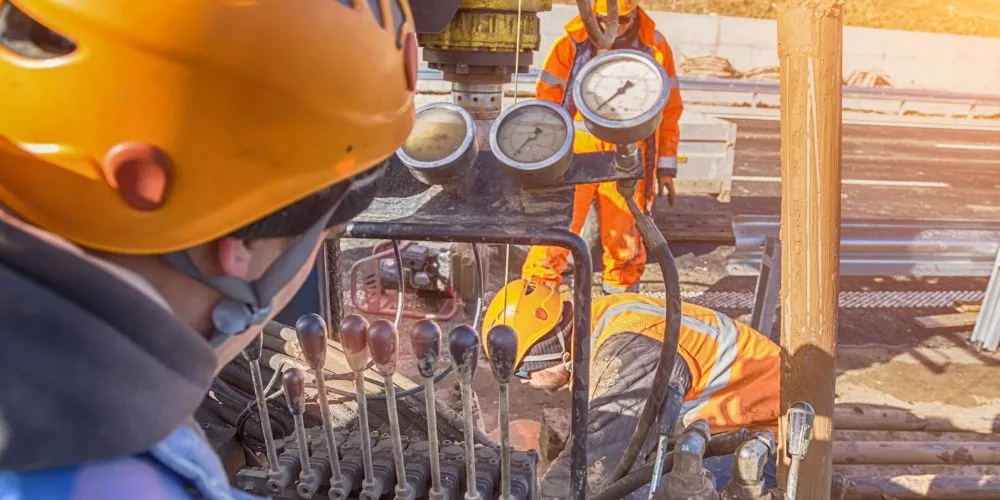Geotechnical Engineering is a cornerstone in civil engineering, delving into the intricate and dynamic interactions between the Earth’s materials and engineered structures. This article unravels the complexities of Geotechnical Engineering, exploring its fundamental principles, diverse applications, key methodologies, and the challenges it tackles within the realm of construction and infrastructure development.
Unveiling Geotechnical Engineering
Geotechnical Engineering is a specialized branch of civil engineering that focuses on understanding the behavior of the Earth’s materials and applying this knowledge to the design and construction of various civil infrastructures. It encompasses various tasks, from soil and rock mechanics to foundation design and slope stability analysis. The Geotechnical Engineer is crucial in ensuring the stability and safety of structures built on or in the ground.
Key Components of Geotechnical Engineering
To comprehend the depth of Geotechnical Engineering, it’s essential to understand its key components, which include:
- Site Investigation: Geotechnical Engineers begin with comprehensive site investigations to understand the geological and geophysical characteristics of the site. It involves soil sampling, testing, and analysis to gather data crucial for subsequent design phases.
- Soil Mechanics: Understanding the mechanical properties of soil is fundamental. Geotechnical Engineers analyze soil composition, strength, and deformation characteristics to make informed decisions about foundation design and construction methods.
- Foundation Design: It is critical to design foundations that can support the loads of structures above them. Geotechnical Engineers employ their knowledge of soil mechanics to design foundations that ensure structural stability and safety.
Applications of Geotechnical Engineering
With its profound knowledge of Earth’s materials, it finds applications across a broad spectrum of construction and infrastructure projects. Its contributions are fundamental to the structural integrity and safety of various types of constructions.
Building Foundations
In building construction, Geotechnical Engineering plays a pivotal role in designing foundations that can withstand the diverse loads exerted by the structures. Engineers can determine the most suitable foundation type through a meticulous evaluation of soil conditions, ensuring optimal structural support.
Bridge Construction
For bridge construction, Geotechnical Engineers conduct in-depth analyses of subsurface conditions. This analysis guides the design of stable foundations, addressing slope stability concerns and ensuring bridges can withstand dynamic loads and environmental factors.
Tunneling Projects
Geotechnical Engineering is indispensable in tunneling projects, where structures are embedded within the Earth. Engineers must assess ground conditions, design support structures, and ensure tunnel stability during and after construction.
Earthquake Engineering
In regions prone to seismic activity, Geotechnical Engineering takes center stage in designing structures capable of withstanding ground shaking. Through a nuanced understanding of soil-structure interaction, engineers minimize the impact of earthquakes, contributing to enhanced structural resilience.
Methodologies in Geotechnical Engineering
The methodologies employed in Geotechnical Engineering serve as the guiding principles for assessing, analyzing, and designing structures that interact with the Earth’s materials. These methodologies are the bedrock upon which the entire discipline is built.
Geotechnical Site Investigations
The journey into Geotechnical Engineering commences with thorough site investigations. Geotechnical Engineers embark on collecting essential data on soil composition, groundwater levels, and geological features. This comprehensive data provides the foundation for assessing the feasibility of construction projects.
Soil Testing and Analysis
The crux of Geotechnical Engineering lies in soil testing and analysis. Engineers conduct a battery of tests to unravel soil’s physical and mechanical properties. Armed with this knowledge, they make informed decisions on foundation design, slope stability, and overall construction methodology.
Numerical Modeling
The advent of technology has ushered in the era of numerical modeling in Geotechnical Engineering. Engineers harness the power of computer simulations to analyze complex interactions between soil and structures. Through advanced software, they can predict the behavior of the ground, optimizing designs for enhanced efficiency.
Slope Stability Analysis
Slope stability analysis is a critical facet of Geotechnical Engineering, especially in projects involving hillsides or slopes. Engineers assess factors such as soil type, slope angle, and groundwater conditions to prevent landslides and ensure the overall stability of the terrain.
Challenges in Geotechnical Engineering
While Geotechnical Engineering is the bedrock of safe and robust construction, it encounters challenges. Navigating through these challenges is imperative for the success of construction projects, ensuring structures remain resilient and stable.
Uncertain Soil Conditions
One of the foremost challenges lies in the uncertainty of soil conditions. Site conditions can be unpredictable, and unexpected variations in soil properties can pose significant challenges. Geotechnical Engineers must adeptly navigate these uncertainties through thorough site investigations and ongoing monitoring.
Mitigating Foundation Settlement
Foundation settlement, a potential challenge, can arise due to various factors, including soil consolidation. Geotechnical Engineers employ various techniques, including proper foundation design and soil improvement, to mitigate the risks associated with settlement and ensure long-term structural stability.
Managing Groundwater
Groundwater can substantially influence construction projects, potentially leading to soil erosion and instability. Geotechnical engineers must devise strategies to manage groundwater effectively, mitigating potential issues and ensuring the overall stability of the project.
Urbanization and Land Use Changes
In the ever-evolving urban environment, changes in land use and increasing urbanization can significantly alter the load conditions on the ground. Geotechnical Engineers are tasked with considering these changes to guarantee the long-term stability of existing and new structures amid dynamic urban landscapes.
Future Trends in Geotechnical Engineering
As technology continues its relentless march forward, future trends in Geotechnical Engineering signal a shift toward more innovative and sustainable practices. These trends aim to enhance the discipline’s efficiency, precision, and environmental consciousness.
Remote Sensing and Monitoring
The integration of remote sensing technologies marks a transformative trend in Geotechnical Engineering. These technologies enable Geotechnical Engineers to monitor construction sites remotely, providing real-time data on ground conditions and structural performance. It facilitates proactive decision-making and enhances the overall efficiency of projects.
Sustainable Geotechnics
Embracing sustainable practices is an emerging trend in Geotechnical Engineering. It involves incorporating environmentally friendly construction materials, minimizing the environmental impact of projects, and ensuring that construction practices align with broader sustainability goals.
Advanced Data Analytics
The marriage of Geotechnical Engineering with advanced data analytics and machine learning is becoming increasingly prominent. These technologies empower engineers to interpret complex geotechnical data more accurately, leading to more precise predictions and optimized designs.
Smart Foundations
The concept of smart foundations represents a paradigm shift in Geotechnical Engineering. Integrating sensors into foundations allows for real-time monitoring of performance. This proactive approach enables early detection of potential issues, facilitating timely interventions and ensuring the longevity of structures.
Conclusion
Geotechnical Engineering emerges as a bedrock discipline in civil engineering, wielding significant influence over the safety and stability of structures that shape our built environment. From the foundational design of buildings to intricate tunneling projects, the applications of Geotechnical Engineering are vast and impactful. Despite confronting challenges linked to uncertain soil conditions and urbanization, the discipline continues to evolve, leveraging innovative methodologies and cutting-edge technologies.
The future holds promising trends in remote sensing, sustainability, advanced analytics, and smart foundations, painting a dynamic and optimistic trajectory for Geotechnical Engineering. The responsibility to harness the full potential of this discipline lies in the hands of dedicated professionals, urging them to embrace technological advancements, sustainable practices, and a commitment to ensuring the stability and safety of the structures that define our diverse landscapes.





